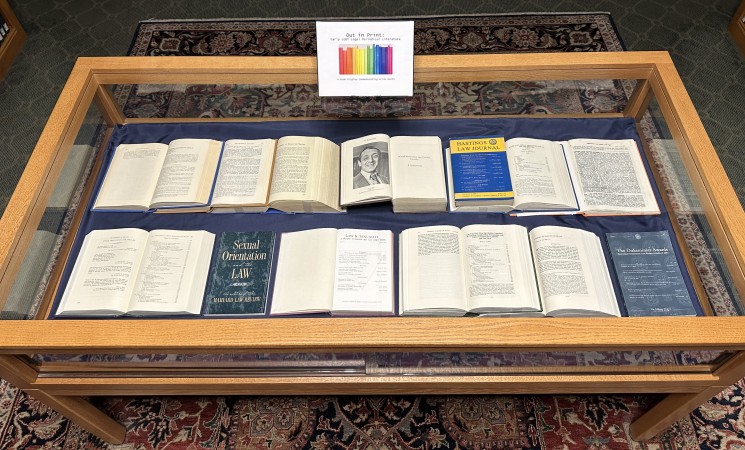
In commemoration of Pride Month, the Lillian Goldman Law Library invites you to view “Out in Print: Early LGBT Legal Periodical Literature,” a new book display located in the Class of 1964 Reading Room on L3. The materials in this display recount the advent and early development of LGBT perspectives in American law journals. The annotated bibliography below explains the significance of each featured item.
Karl M. Bowman & Bernice Engle, A Psychiatric Evaluation of the Laws of Homosexuality, 29 Temple L.Q. 273 (1956).
The earliest legal periodical literature about homosexuality took a clinical approach. Articles like this one, heavily influenced by the Kinsey and Wolfenden reports, endorsed the gradual liberalization of sodomy laws and the introduction of procedural reforms to protect the rights of those accused of the crime. Articles taking a more strident stance that centered the rights of lesbians and gay men would not begin to appear in American law journals for another decade.
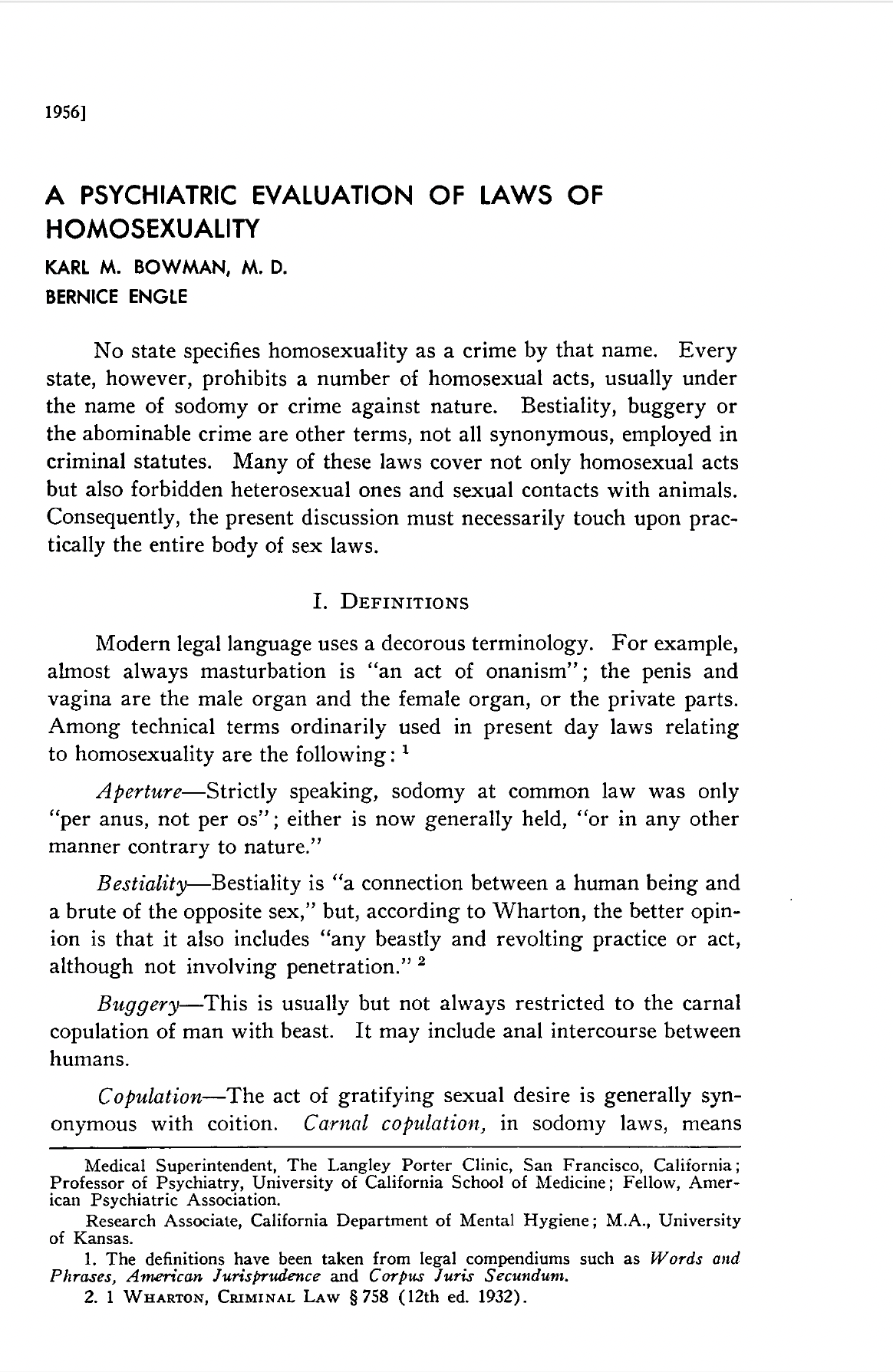
Roger M. Fritts & Favor R. Smith, Comment, Deviate Sexual Behavior: The Desirability of Legislative Proscription, 30 Alb. L. Rev. 291 (1966).
Law students are often at the forefront of social movements, so it comes as no surprise that one of the earliest law review articles to aggressively criticize the criminalization of homosexuality is a student-written comment. In this comprehensive analysis, the authors detail the litany of unintended social consequences and negative policy outcomes created by the continued legislative proscription of sexual relations between consenting adults of the same sex.
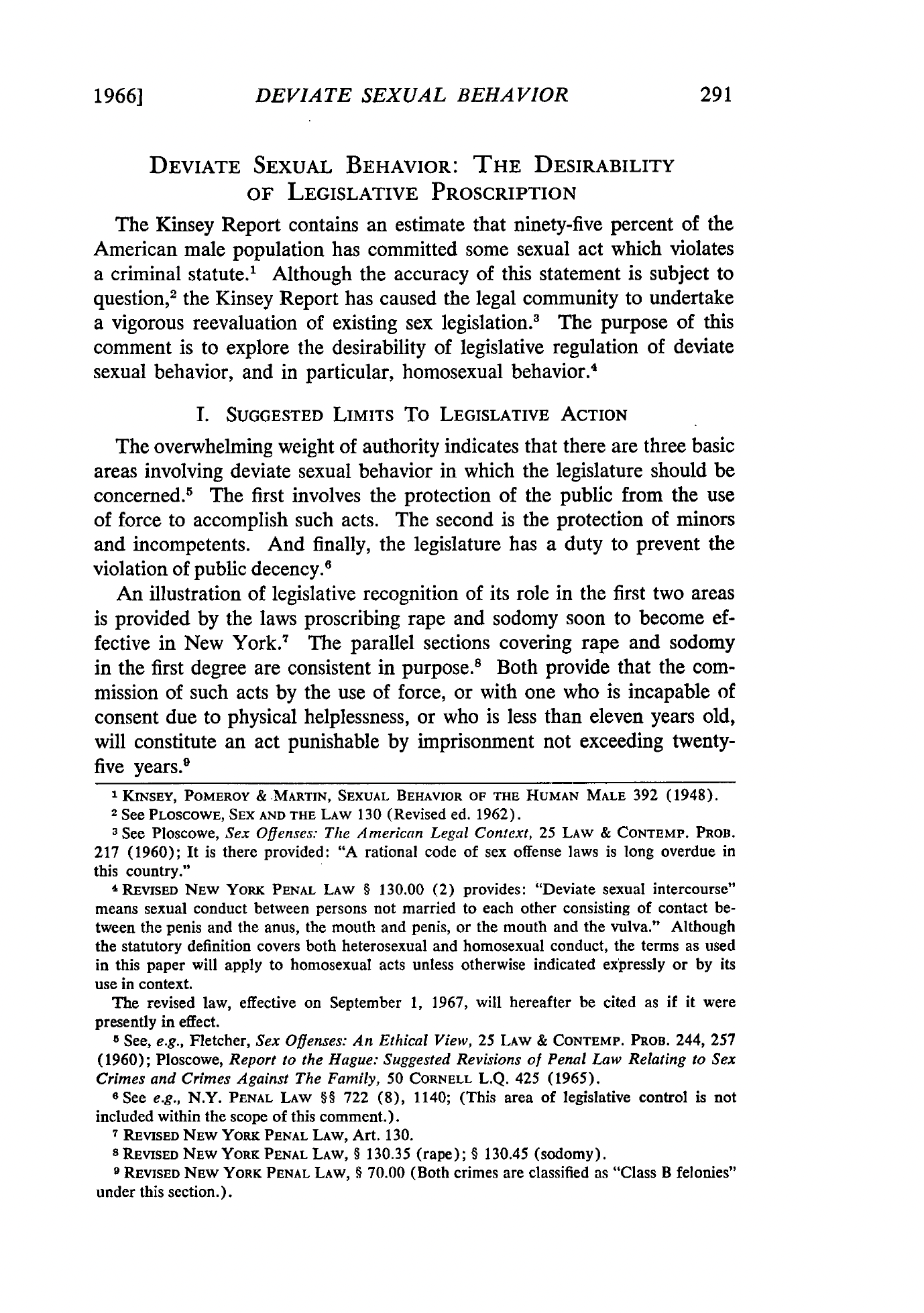
Note, The Legality of Homosexual Marriage, 82 Yale L.J. 573 (1973).
This unsigned student note published less than four years after the Stonewall riots is perhaps the first piece championing gay rights to appear in a Yale law journal. Whereas most early gay rights efforts were focused on the decriminalization of homosexuality, the author or authors of this note look beyond the hurdle of consensual sodomy statues to argue for the legal recognition of same-sex relationships under the Equal Protection Clause and the then-proposed Equal Rights Amendment.
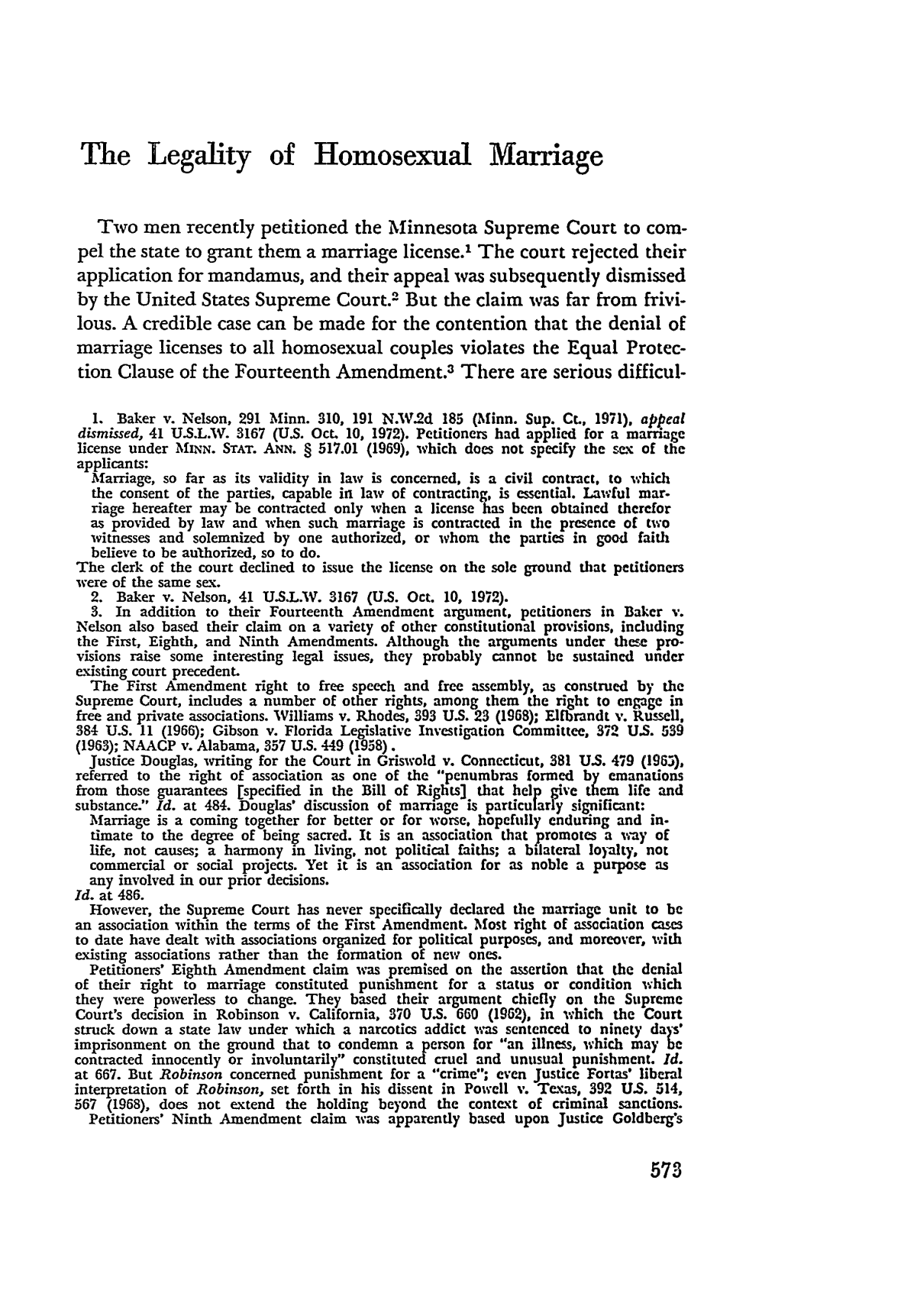
Symposium: Sexual Preference and Gender Identity, 30 Hastings L.J. 799 (1979).
The Hastings Law Journal, now known as the UC Law Journal, hosted the first law review symposium dedicated to LGBT issues in 1979. Of particular interest is a frontispiece featuring a portrait of San Francisco Supervisor Harvey Milk, whose assassination the previous year served as the impetus for the organization of the symposium.
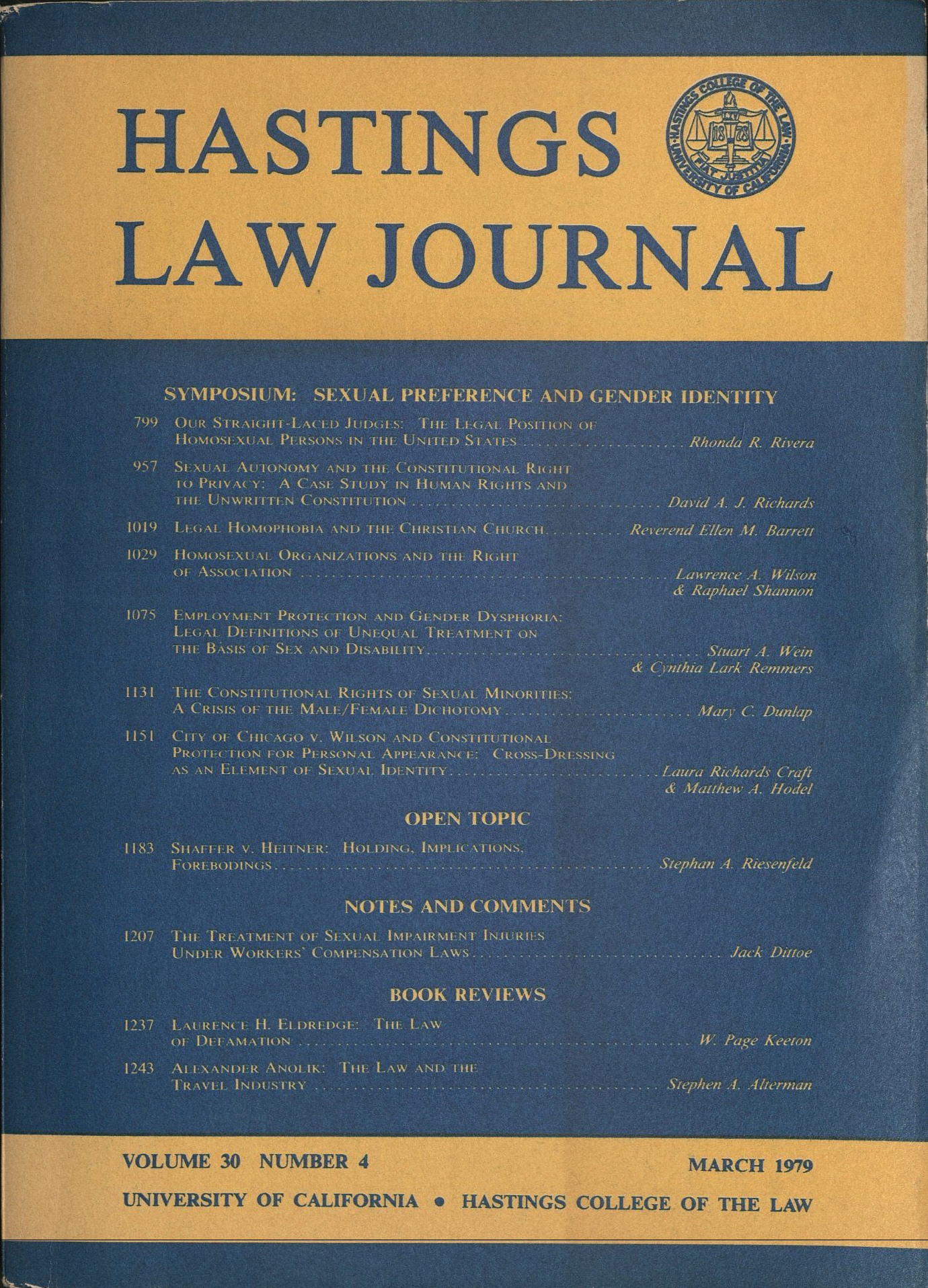
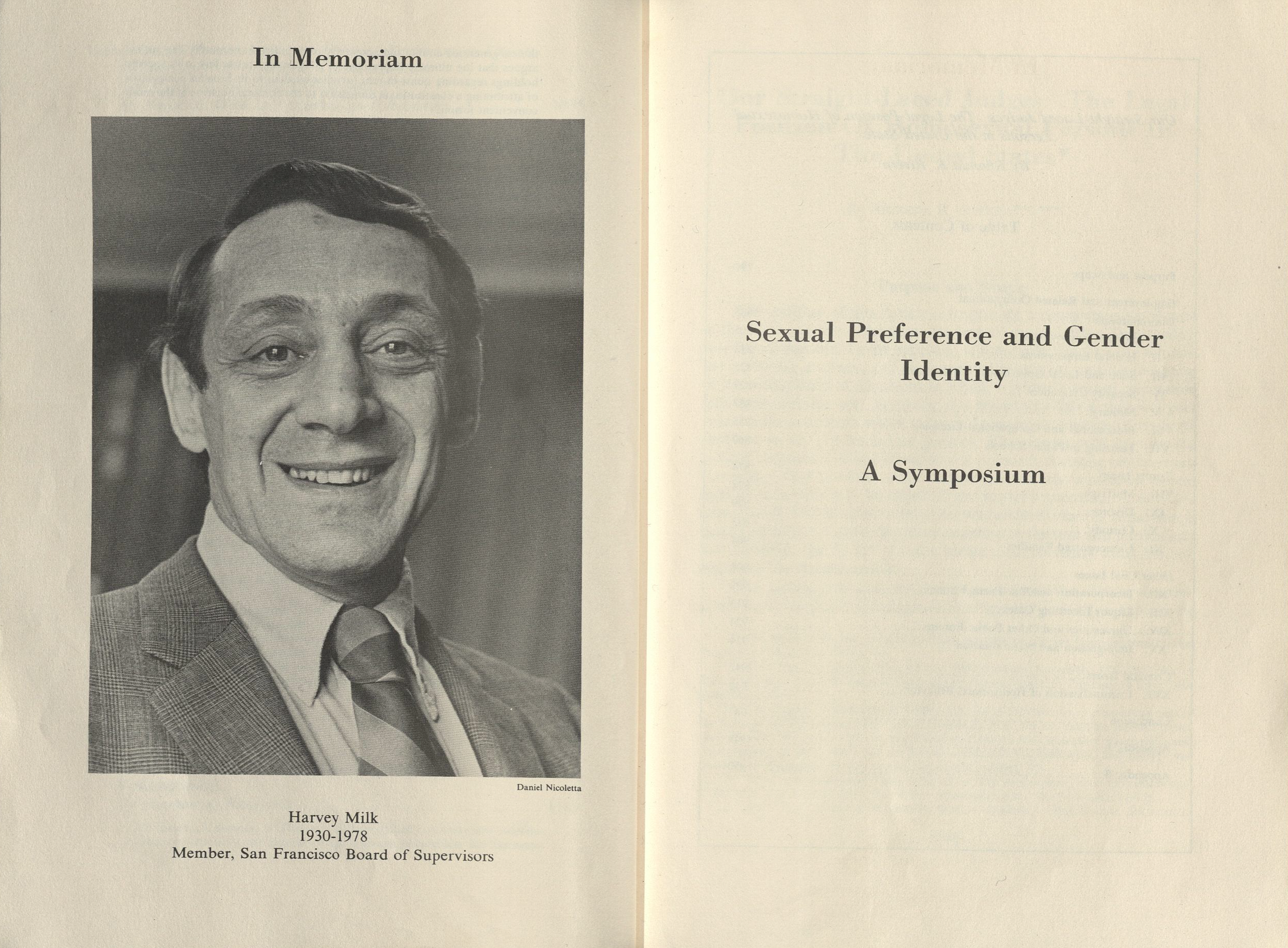
Lesbian/Gay Law Notes, June 1984.
In 1978, Arthur Leonard, who would join the faculty of New York Law School in 1982, organized the New York Law Group (now known as the LGBT Bar Association of New York). In 1979, Leonard began including photocopies of news stories about laws affecting lesbians and gay men along with his commentary in the group’s monthly mailing. In January 1980, Leonard formalized this publication, entitling it New York Law Group Notes. When the New York Law Group incorporated as the Bar Association for Human Rights (BAHR) of Greater New York in 1984, Leonard split this publication into the BAHR Report, the organization’s newsletter, and Lesbian/Gay Law Notes, a journal dedicated to tracking case law, legislation, and law journal articles related to gay rights. The first issue of Lesbian/Gay Law Notes appeared in June 1984. The circulation of Lesbian/Gay Law Notes soon expanded beyond BAHR members to include academic law libraries and lawyers in other cities, and it became an important source for legal information about HIV/AIDS. Lesbian/Gay Law Notes continues today as LGBT Law Notes, which bills itself as “the oldest continuously published law journal dedicated to scholarship on legal developments specific to LGBTQ+ people.”
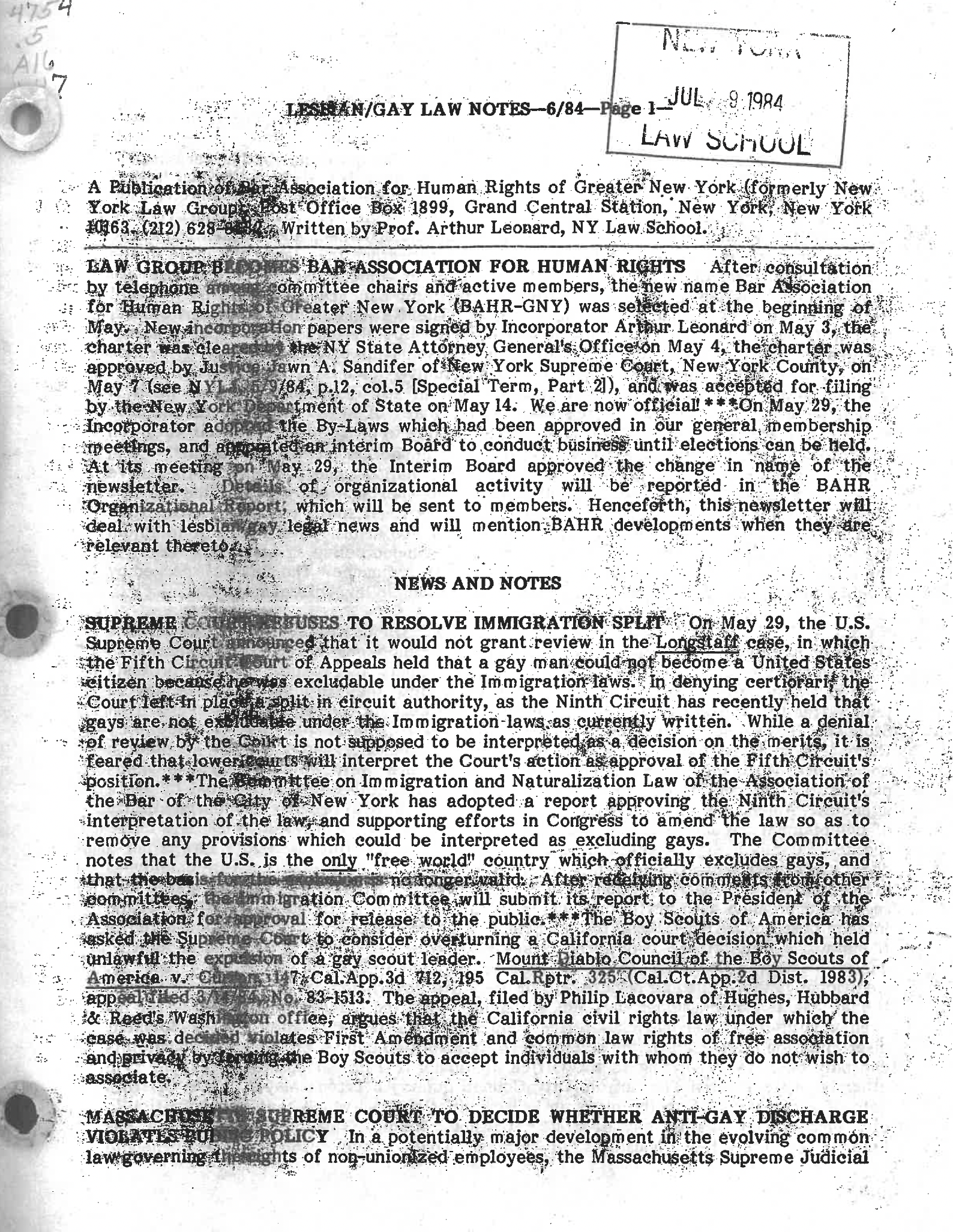
Rhonda Rivera, Queer Law: Sexual Orientation Law in the Mid-Eighties (pts. I & II), 10 U. Dayton L. Rev. 459 (1985), 11 U. Dayton L. Rev. 275 (1986).
Explicitly written for a diverse audience that included practitioners litigating gay rights cases, lesbian and gay law students, lesbian and gay lay persons, and interested legal scholars, this two-part article by Rhonda Rivera, a professor at the Ohio State University College of Law and a contributor to the 1979 Hastings symposium, is regarded as the first attempt to conceptualize sexual orientation law as a distinct field.
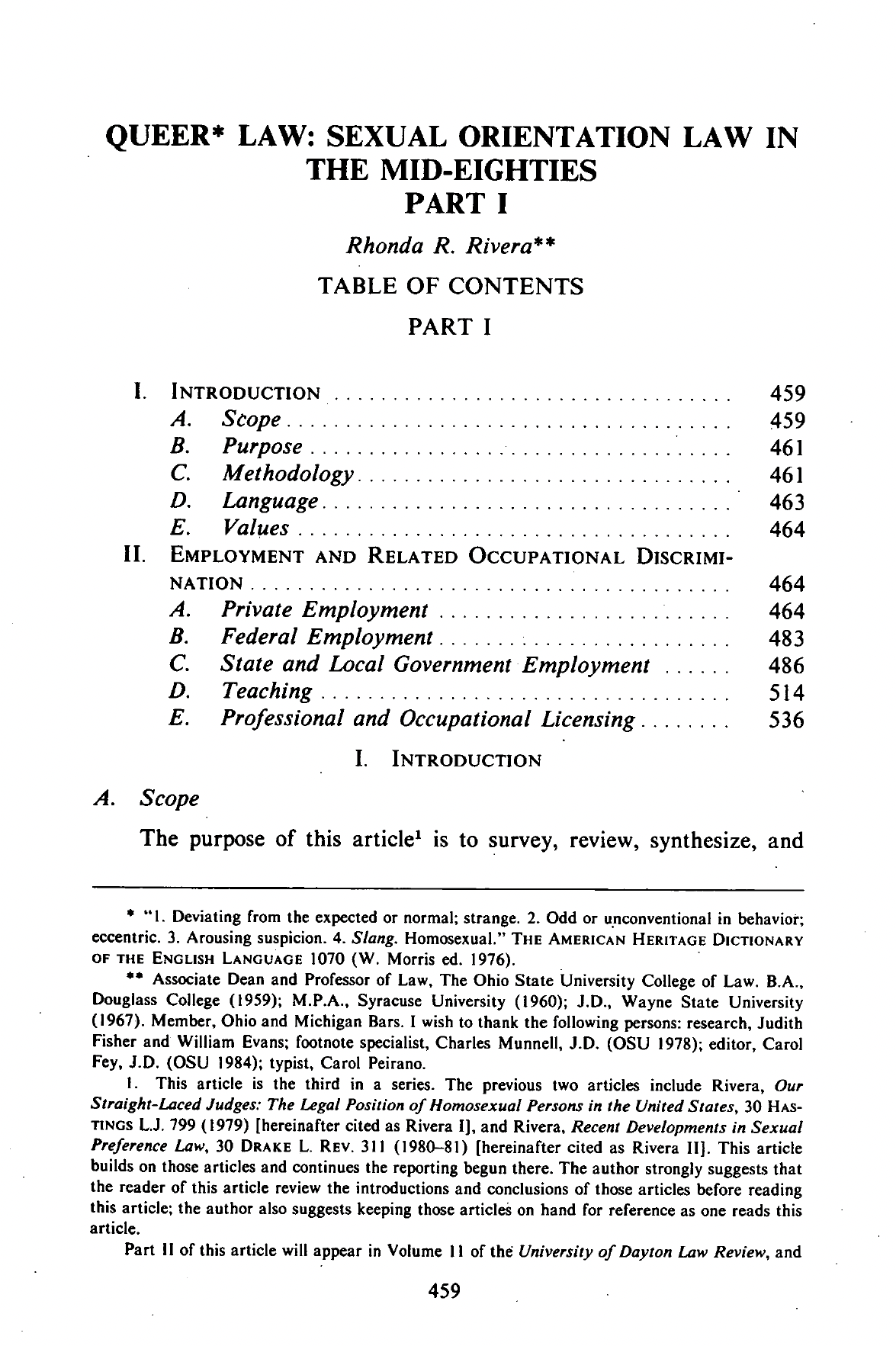
Developments in the Law: Sexual Orientation and the Law, 102 Harv. L. Rev. 1508 (1989), reprinted as Editors of the Harvard Law Review, Sexual Orientation and the Laws (1990).
The literature of sexual orientation law continued to grow through the late 1980s. The 1989 publication of this special “developments in the law” issue of the Harvard Law Review dedicated to law and sexual orientation served as a high-water mark. It was republished as a monograph by the Harvard University Press the next year.

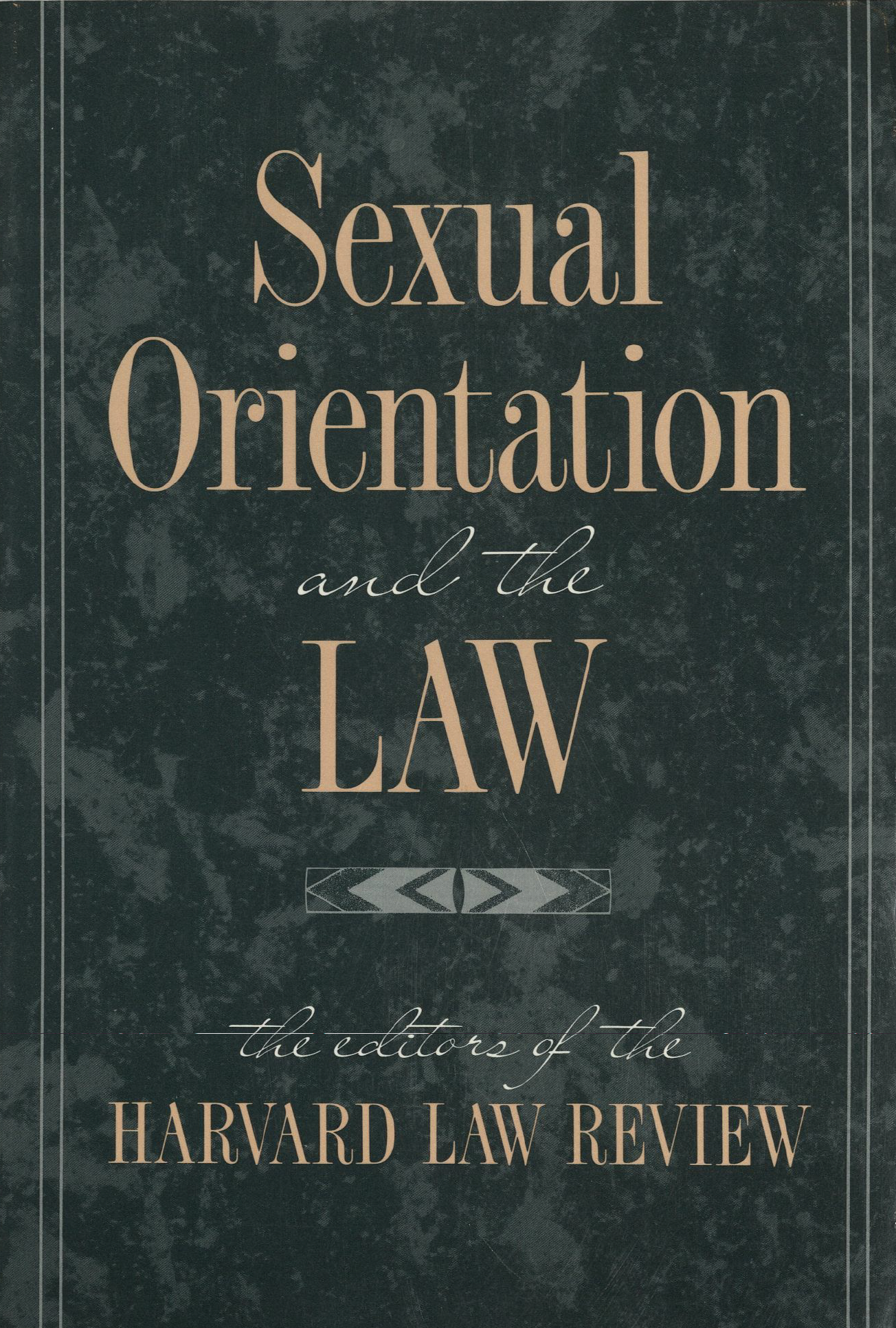
1 Law & Sexuality: Rev. Lesbian & Gay Legal Issues 1 (1991).
From the late 1960s onward, dozens of law journals dedicated to issues of gender and race were established at law schools across the country. In 1991, students at Tulane University Law School began the first and only student-edited law journal dedicated to law and sexuality. The first issue of this journal features several prominent early scholars of sexual orientation law. Law and Sexuality continues today as the. Tulane Journal of Law & Sexuality: A Review of Sexual Orientation and Gender Identity in the Law.
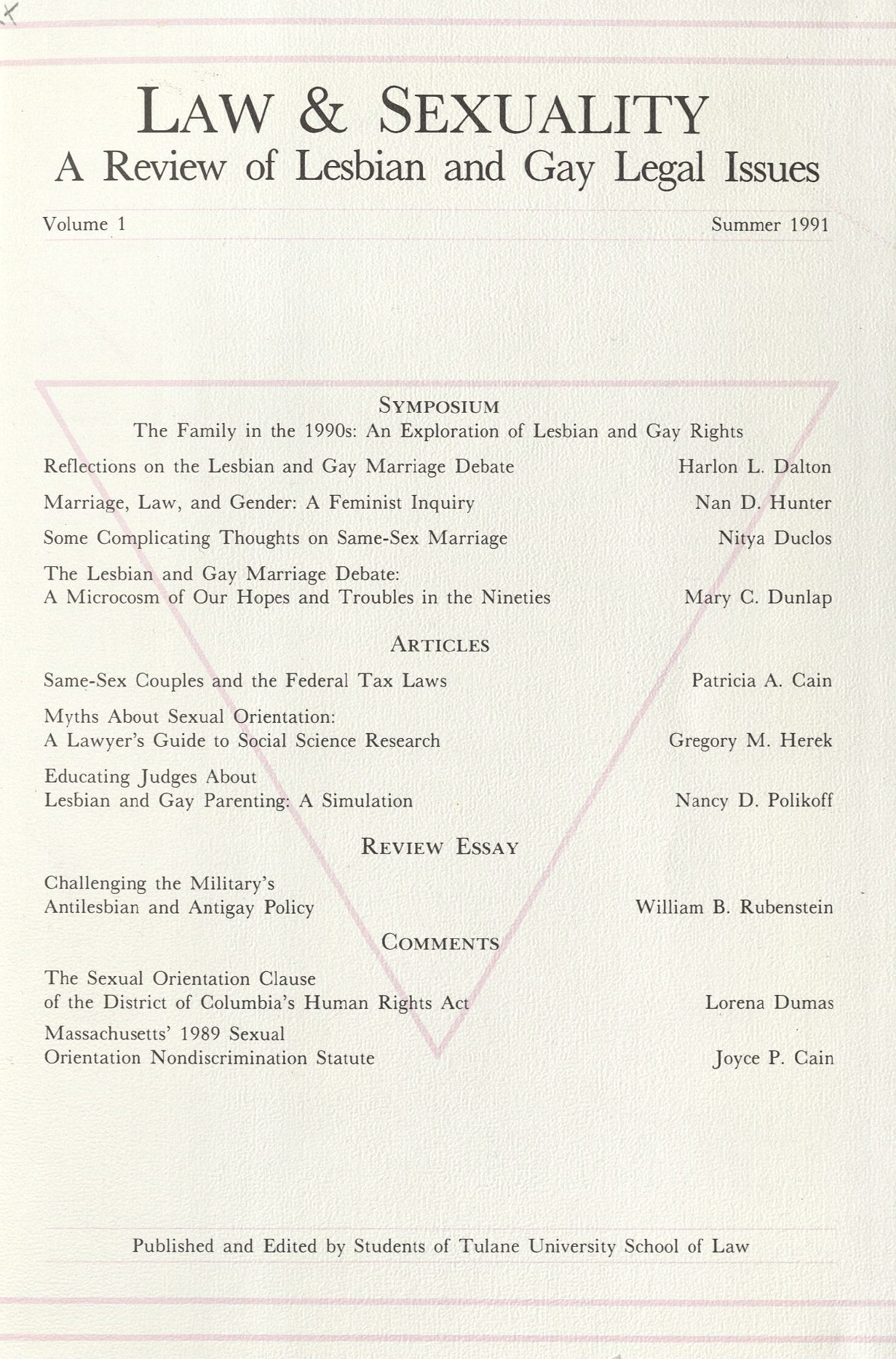
Marc A. Fajer, Can Two Real Men Eat Quiche Together? Storytelling, Gender-Role Stereotypes, and Legal Protection for Lesbians and Gay Men, 46 U. Miami L. Rev. 511 (1992).
In this contribution to a symposium on gender and the law, Marc Fajer, a professor at the University of Miami School of Law, uses legal storytelling, an innovative and controversial form of legal scholarship championed by feminist legal scholars and critical race theorists, to describe and counter “aspects of non-gay pre-understanding” about lesbians and gay men that motivate discrimination against them and contribute to their oppression in society. In doing so, Fajer anticipates and lays the groundwork for the emergence of queer legal theory, a scholarly movement that employs the insights of critical legal theory to challenge the law’s conflation and regulation of sex, gender, and sexual orientation.
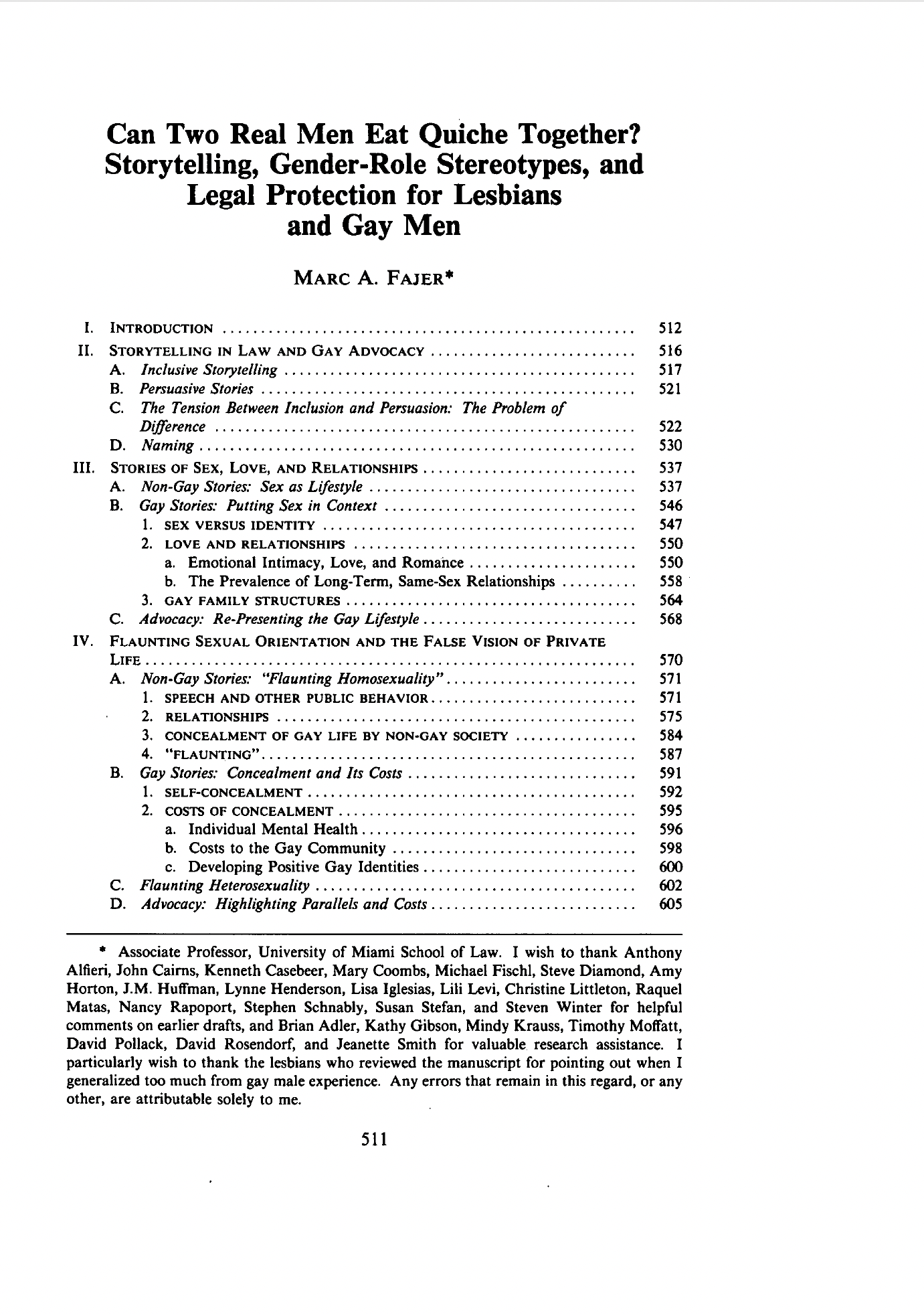
William Eskridge, A History of Same-Sex Marriage, 79 Va. L. Rev. 1419 (1993).
In one of his earliest and most-cited articles on gay rights, Yale Law School’s William Eskridge, then a professor at Georgetown University Law Center litigating Dean v. District of Columbia, 653 A.2d 307 (D.C. 1995), draws on scholarship from the fields of anthropology, ethnography, mythology, comparative literature, sociology, and ecclesiastical history to forge a social constructionist historical argument for same-sex marriage. In the years following the publication of this article, Eskridge authored dozens of articles, several scholarly monographs, and a casebook on sexuality, gender, and the law. His work, which emphasizes the role gender norms play in the law’s treatment of sexuality, has served as the foundation for several LGBT rights victories at the United States Supreme Court.
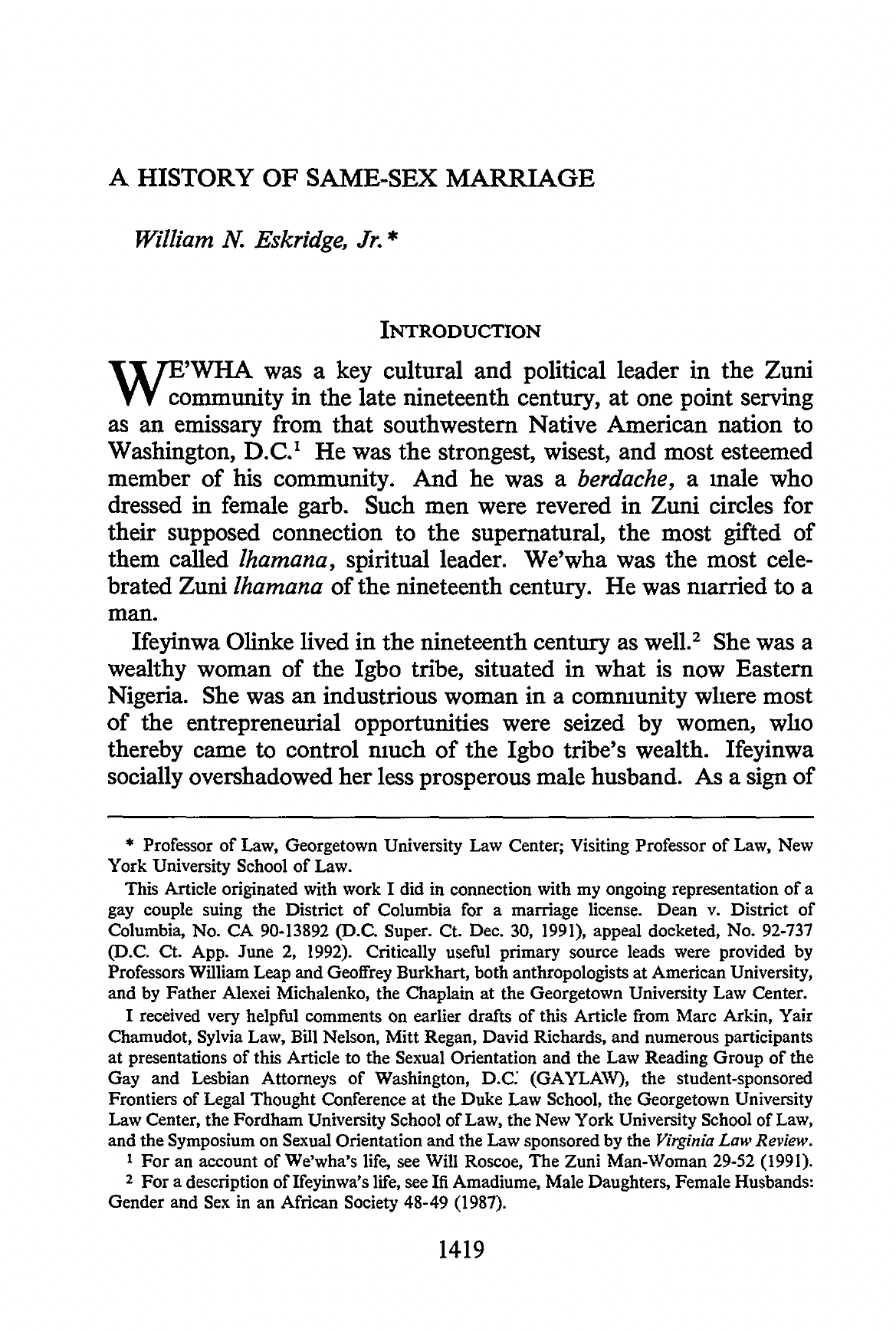
1 Dukeminier Awards: Best Sexual Orientation L. Rev. 1 (2002).
In 2002, just a year before the United States Supreme Court would invalidate consensual sodomy statutes in Lawrence v. Texas, 539 U.S. 558 (2003), and two years before the Massachusetts Supreme Judicial Court would find that same-sex couples have a right to marry under the Massachusetts Constitution in Goodridge v. Dept. of Public Health, 798 N.E.2d 941 (Mass. 2003), the Williams Institute, a UCLA Law-based think tank, published the first volume of the Dukeminier Awards Journal. Named for Jesse Dukeminier (1925–2003), the noted legal scholar and openly gay man who served for forty years on the UCLA Law faculty, this journal continues to recognize and encourage excellence in legal scholarship dedicated to sexual orientation and gender identity law and public policy.
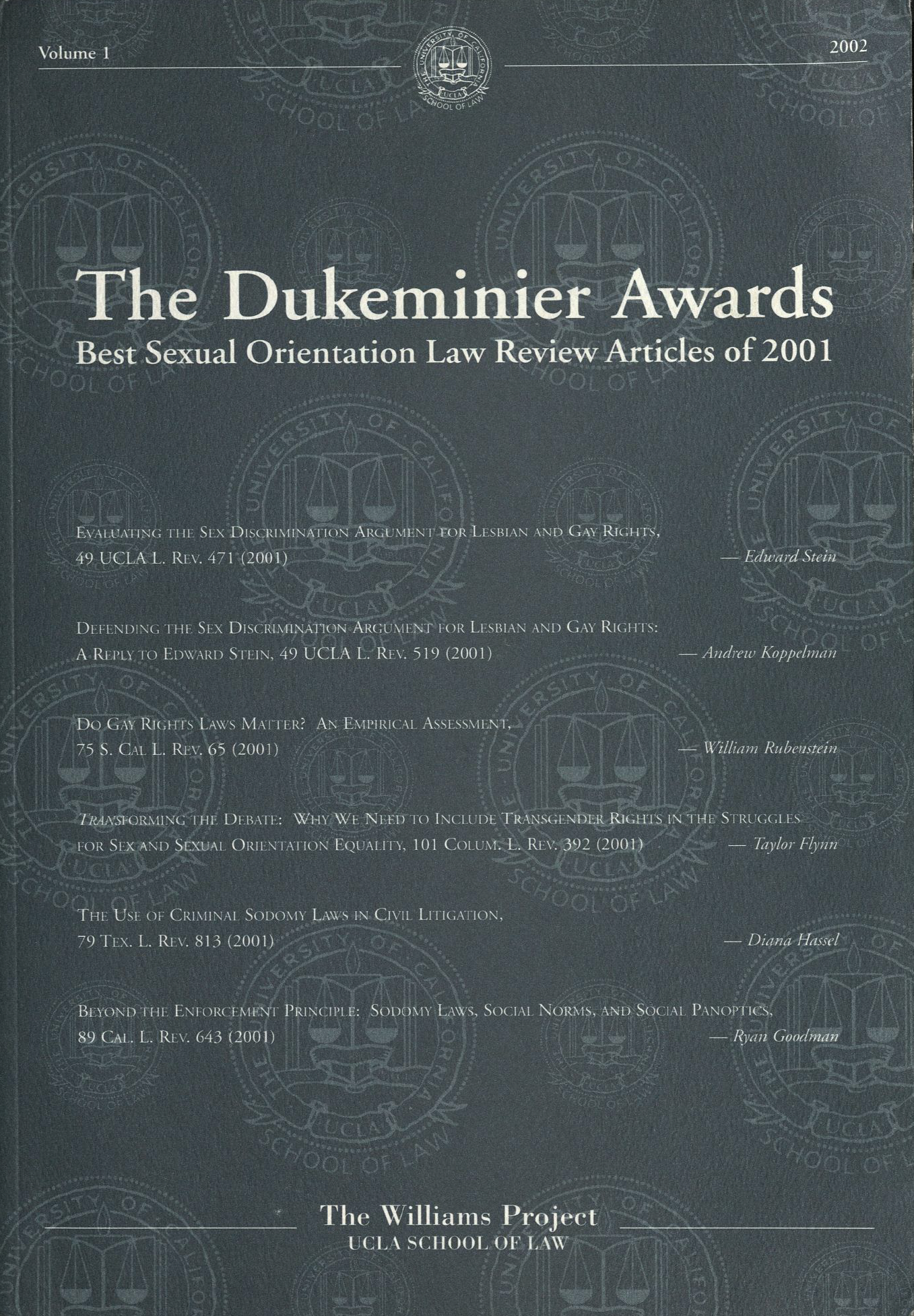
What are we to make of this collection of scholarly ephemera? It is notable that proposals for the decriminalization of homosexuality and the legal recognition of same-sex relationships appeared in the pages of law journals decades before they were taken up by legislatures and appellate courts. It would appear then that advocates in the legal academy have played an important role in securing legal rights for lesbian, gay, bisexual, and transgender people, and that the law journal has been one of their primary tools for achieving this end.
Further Reading:
Brad Sears, The Scholarship of the Possible: Sexual Orientation Law Scholarship 1994–2005, in Sexual Orientation and the Law: A Research Bibliography Selectively Annotating Legal Literature Through 2005, at xx (2006).
Arthur S. Leonard, Introduction: A Retrospective on the Lesbian/Gay Law Notes, 17 N.Y.L. Sch. J. Hum. Rts. 403 (2000).
* Special thanks to Camille Broussard, Professor of Law and Associate Dean for Information Services at New York Law School, and Fred Shapiro, Associate Director for Collections and Special Projects at the Lillian Goldman Law Library and Lecturer in Legal Research at Yale Law School, for their help in compiling these sources.
